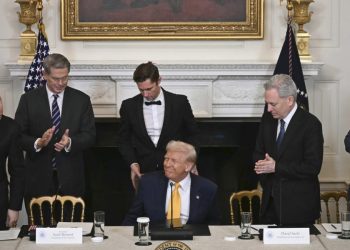“When you worship power, compassion and mercy will look like sins.”
Benjamin Cremer, a Wesleyan pastor and writer who is based in Idaho, posted that thought last year. I saw it last week and immediately forwarded it to some of my close friends with a note that said that this sentence captures our political moment. It helps describe America’s moral divide.
Over the last decade, I’ve watched many of my friends and neighbors make a remarkable transformation. They’ve gone from supporting Donald Trump in spite of his hatefulness to reveling in his aggression.
This isn’t a new observation. In fact, it’s so obvious as to verge on the banal. The far more interesting question is why. How is it that so many Americans seem to have abandoned any commitment to personal virtue — at least in their political lives — and have instead embraced merciless political combat so enthusiastically that they believe you’re immoral if you don’t join their crusade or even if you don’t mimic their methods?
It’s a question with a multifaceted answer. In December, I wrote a column examining the question through a specifically religious lens. When a person believes that he or she possesses eternal truth, there’s a temptation to believe that he or she is entitled to rule.
There’s a difference, however, between yielding to temptation and developing an alternative morality. And what we’ve been witnessing in the last decade is millions of Americans constructing a different moral superstructure. And while it is certainly notable and powerful in Trumpism, it is not exclusive to Trumpism.
A good way to understand this terrible political morality is to read Carl Schmitt, a German political theorist who joined the Nazi Party after Hitler became chancellor. I want to be careful here — I am not arguing that millions of Americans are suddenly Schmittians, acolytes of one of the fascist regime’s favorite political theorists. The vast majority of Americans have no idea who he is. Nor would they accept all of his ideas.
One of his ideas, however, is almost perfectly salient to the moment: his description, in a 1932 book called “The Concept of the Political,” of the “friend-enemy distinction.” The political sphere, according to Schmitt, is distinct from the personal sphere, and it has its own distinct contrasts.
“Let us assume,” Schmitt wrote, “that in the realm of morality the final distinctions are between good and evil, in aesthetics beautiful and ugly, in economics profitable and unprofitable.” Politics, however, has “its own ultimate distinctions.” In that realm, “the specific political distinction to which political actions and motives can be reduced is that between friend and enemy.”
One of liberalism’s deficiencies, according to Schmitt, is a reluctance to draw the friend-enemy distinction. Failing to draw it is a fool’s errand. An enduring political community can exist only when it draws this distinction. It is this contrast with outsiders that creates the community.
Schmitt was being both descriptive and prescriptive here. If the friend-enemy distinction is necessary to the creation and preservation of a political community, then it can be destructive to seek accommodation with your political opponents. This is human nature, and it’s naïve not to yield to our essential character.
Schmitt was partly right. The friend-enemy distinction is an aspect of human nature, and we are constantly tempted to yield to it, to rationalize it and to indulge it. Rather than resist it, we want to find some way to make it right, often simply to preserve our self-conception that we are moral and decent people.
He was also right that the friend-enemy distinction is ultimately incompatible with the liberal democratic project. Pluralism seeks to create a community in which historical enemies can live in peace and flourish side by side. If the friend-enemy distinction is an essential feature of human nature, how can pluralism survive?
No one was more aware than the founders that the American experiment contradicts our base natures. A century before Schmitt was born, they understood that reality intimately.
Our government is constructed with the understanding that, as James Madison famously put it in Federalist No. 51, “If men were angels, no government would be necessary. If angels were to govern men, neither external nor internal controls on government would be necessary.”
The Constitution tries to ameliorate the will to power as best it can — as Madison said in the same essay, “ambition must be made to counteract ambition” — but the founders also knew that even our elaborate system of checks and balances is insufficient. To make our system work, virtue is a necessity.
“We have no Government armed with Power capable of contending with human Passions unbridled by morality and Religion,” John Adams wrote in his 1798 Letter to the Massachusetts Militia, “Avarice, Ambition, Revenge or Galantry, would break the strongest Cords of our Constitution as a Whale goes through a Net.”
Adams’s New England metaphor is perfect (his readers would absolutely know what a whale would do to a net): Pluralism requires both law and ethics to function, and without ethics the law will fail.
We forget how much the founders — for all their faults — were focused not just on the forms of American government, but also on personal virtue. One of my favorite books from last year was “The Pursuit of Happiness” by Jeffrey Rosen, the president of the National Constitution Center.
The book describes how the founders envisioned the pursuit of happiness not as the pursuit of pleasure or wealth, but rather as “the pursuit of virtue — as being good, rather than feeling good.” Benjamin Franklin, for example, listed temperance, silence, order, resolution, frugality, industry, sincerity, justice, moderation, cleanliness, tranquillity, chastity and humility as indispensable elements of virtue.
You can immediately see the contrast with Schmitt’s friend-enemy politics. Virtue ethics certainly recognizes the existence of enemies, but it still imposes moral obligations on our treatment of our foes. The virtues Franklin listed are not simply the way you love your own political tribe; they are universal moral obligations that apply to our treatment of everyone.
Demonstrate these virtues, and your enemies can live with dignity and freedom even when they lose a political battle. When your enemies show the same virtues, you can still enjoy a good life even when you lose. That’s the social compact of pluralism. In a decent society, no defeat is ultimate defeat, and no victory is ultimate victory. And in all circumstances, your fundamental human rights must be preserved.
Dive too deeply into the friend-enemy distinction, by contrast, and it can become immoral to treat your enemies with kindness if kindness weakens the community in its struggle against a mortal foe. In the world of the friend-enemy distinction, your ultimate virtue is found in your willingness to fight. Your ultimate vice is betraying your side by refusing the call to political war.
The friend-enemy distinction explains why so many Republicans are particularly furious at anti-Trump dissenters — especially when those dissenters hold conservative values. In the friend-enemy distinction, ideology is secondary to loyalty.
You see this principle at work in Trump’s decision to pardon or commute the sentences of the Jan. 6 rioters and to revoke Secret Service protection from one of his former national security advisers, John Bolton, and from one of his former secretaries of state, Mike Pompeo. Friends can get away with violent crimes. Bolton and Pompeo publicly criticized Trump, and now they’re enemies who have to pay the price.
While Trumpists are among the most vicious voices in the public square, merciless aggression is sadly common across the political spectrum, especially at the extremes. I’ve seen far-left activists utterly demonize their opponents. Any deviation from orthodoxy is perceived as evil, and evil must be utterly eradicated.
And there’s no humility in cancel culture — regardless of whether it comes from left or right.
Because our civics depends on our ethics, we should be teaching ethics right alongside civics. Sadly, we’re failing at both tasks, and our baser nature is telling millions of Americans that cruelty is good, if it helps us win, and kindness is evil, if it weakens our cause. That is the path of destruction. As the prophet Isaiah said, “Woe to those who call evil good and good evil.”
Woe to them, yes, but as friend-enemy politics dominates our discourse, tears our families and communities to shreds and reshapes our national morality, a darker thought crosses my mind.
Woe to us all.




















